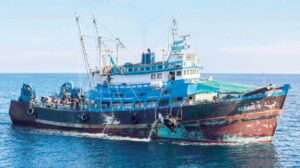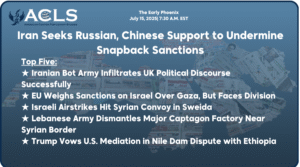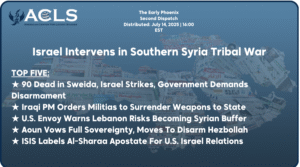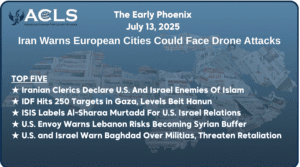The Region: A Middle East Newsletter
THE REGION is a weekly news digest summarizing significant Middle East developments that will be of interest to the English-speaking audience. The news items in THE REGION are curated by ACLS experts and drawn from a wide range of English, Arabic, and other regional language sources. Subscribe to this weekly newsletter and daily intercepts here.
Printable Version
TOP STORY: Damascus: Assad Regime Suffers Crippling Fuel Crisis–and New Outbreak of Anti-Assad Unrest
 Damascus is experiencing an unprecedented fuel shortage that has largely shut down commerce and government services and shocked the Syrian population. In response, the Assad regime is attempting to manage the crisis by deflecting blame from the large–scale regime corruption and waste that has angered even Assad’s most loyal constituents. In his effort to explain the general paralysis in Damascus, Assad’s Oil Minister Bassam Tohme claimed the unprecedented shutdown of major governmental institutions, phone services, electricity, and water was due to the U.S.-coordinated seizure of the Iranian tanker ship Pegas in Greece last July, after the vessel was found to be in violation of sanctions imposed on Russia.
Damascus is experiencing an unprecedented fuel shortage that has largely shut down commerce and government services and shocked the Syrian population. In response, the Assad regime is attempting to manage the crisis by deflecting blame from the large–scale regime corruption and waste that has angered even Assad’s most loyal constituents. In his effort to explain the general paralysis in Damascus, Assad’s Oil Minister Bassam Tohme claimed the unprecedented shutdown of major governmental institutions, phone services, electricity, and water was due to the U.S.-coordinated seizure of the Iranian tanker ship Pegas in Greece last July, after the vessel was found to be in violation of sanctions imposed on Russia.
Greek authorities recently released the ship, which is now renamed Lana, after Iran’s Revolutionary Guards pirated two Greek ships as ransom. Greek authorities claimed that the ship had been bought by a different owner after settling a debt and is therefore no longer subject to American sanctions. The Iranian ship, with its 19 Russian crew members, was able to sail to the Syrian port of Banias and deliver 700,000 barrels of Iranian fuel on December 3.
Oil Minister Tohme had previously looked for different scapegoats for Syria’s fuel crisis. On November 30, he blamed the fuel shortage and the astronomical black market price of $12 per gallon for petrol on recent Turkish strikes on the oilfields under the control of the YPG. According to Tohme, the Turkish strikes had stopped all fuel shipments from the northeast to Damascus.
Suwayda in Revolt Against Assad
On Sunday, December 4, Arabic media outlets highlighted the massive civilian protests in Suwayda, the province south of Damascus, against the Assad regime’s corruption that is the root cause of the worst economic crisis Syria has experienced in years. Hundreds of people gathered around the headquarters of the governorate chanting slogans calling for the overthrow of Assad. Security forces fired on the protestors, killing one and wounding 6. Protestors then stormed the building, lowered the flag of the Assad regime, smashed a large picture of Bashar Al Assad, and seized a military vehicle in the vicinity of the building. Protestors also set tires on fire and blocked the Damascus, Suwayda highway. The unexpected outburst of anger in the city indicates the Assad regime’s authority is facing new challenges, even after more than 11 years of war.
SYRIA: Iran Forbids Assad From Meeting With Erdogan
 In response to a Russian proposal for a summit between Assad and Turkish President Erdogan, the Assad regime rejected the Russian idea. Assad reportedly believes that negotiating a reconciliation with Turkey would mean “giving Erdogan a free victory” in his political campaign ahead of Turkish elections next year, especially if the meeting were to focus on Ankara’s goals of returning 3.6 million Syrian refugees to Syria.
In response to a Russian proposal for a summit between Assad and Turkish President Erdogan, the Assad regime rejected the Russian idea. Assad reportedly believes that negotiating a reconciliation with Turkey would mean “giving Erdogan a free victory” in his political campaign ahead of Turkish elections next year, especially if the meeting were to focus on Ankara’s goals of returning 3.6 million Syrian refugees to Syria.
On December 5, Arabic news network Al Hadath, however, reported that “Iran is pushing Assad to resist meeting Erdogan.” According to Al Hadath’s report, the Iranian regime is concerned that agreements between Damascus and Ankara could wind up preventing the Iranians from using their “alternative corridor” for military logistics that extends across northern Iraq and Syria to the Mediterranean Sea. Preserving the “alternative corridor” is an Iranian priority since continuous Israeli airstrikes forced the Iranians to abandon many of their routes further south through the Damascus region.
Turkey-Syria Border Crisis
 On 1 December, former Trump administration Envoy to Syria, Ambassador James Jeffrey met with Turkish Defense Minister Hulusi Akar. Akar disclosed that the United States had urged Ankara to reconsider launching a ground operation, to which Turkey responded by asking Washington “to fulfill its obligations” to ensure Turkey’s security. The following day, 2 December, Turkey’s National Security Council declared its intention not to allow “the presence and activity of any terrorist organization in the region,” thus signalling Ankara’s rejection of U.S. requests to cancel Turkish ground operations into northern Syria.
On 1 December, former Trump administration Envoy to Syria, Ambassador James Jeffrey met with Turkish Defense Minister Hulusi Akar. Akar disclosed that the United States had urged Ankara to reconsider launching a ground operation, to which Turkey responded by asking Washington “to fulfill its obligations” to ensure Turkey’s security. The following day, 2 December, Turkey’s National Security Council declared its intention not to allow “the presence and activity of any terrorist organization in the region,” thus signalling Ankara’s rejection of U.S. requests to cancel Turkish ground operations into northern Syria.
Speaking on the same day at the Mediterranean Dialogue in Rome, Foreign Minister Cavusoglu argued for the need to achieve a consensus between the Syrian opposition and regime, expressing his hopes for Damascus to understand that peace and stability are not possible without consensus. In related news, a Turkish opposition party called the Good Party (iYi Parti) revealed that it is in the final stage of obtaining the approval of Cavasoglu’s ministry to hold a meeting with Assad. The party claimed that Turkey can resolve its border security risks and its Syrian refugee burden through reconciliation with the Syrian regime.
Despite Ankara’s statements of intent, Turkish military operations are continuing but reports show they have dwindled since December 2, with minimal casualties and damage, and that preparations for ground operations into Syria have not advanced.
More Anti-Regime Unrest in Deraa
On Saturday, December 3, a few days after their success in assassinating the ISIS leader in Daraa, dozens of members of Free Syrian Army groups closed the roads leading to the city of Jasim north of Deraa, demanding the release of detainees held by Assad regime authorities. The process of closing the roads came after several demands made by the city’s notables to high officials in the regime forces to work on the release of the detained residents of the city.
TURKEY: Seeking NATO Accession, Sweden Responds to Turkish Concerns About PKK
On 3 December, meanwhile, Sweden deported a convicted member of the PKK to Turkey. The status and treatment of the PKK in Sweden has been a point of contention for Ankara as Sweden has applied for entry into NATO. The deportation was the latest in a series of steps Sweden has taken to try to satisfy Turkey’s concerns and ease Stockholm’s NATO accession.
IRAN: Publicity Stunt Disbanding The “Morality Police” Falls Flat
Iran’s Attorney General Jafar Montazeri announced on 4 December the disbanding of Iran’s so-called “morality police”, but noted that the judiciary will continue to monitor behavioral conduct, hinting that hijab rules are not scrapped. However, to further pacify angry protestors, Montazeri said the Parliament and the Supreme Council of the Cultural Revolution may announce different opinions of the mandatory Hijab rules within two weeks.
In response, Iranian activists announced a three-day nationwide strike starting 5 December. Protesters gathered on Sunday night chanting slogans such as “Khamenei: listen to the sound of revolution.” In Sunni-majority Baluchistan, protests continued for a second week, this time with the participation of women, an event described by Iranian groups as very rare in that region.
The Iranian regime announced the execution of the four individuals accused of “working for the Mossad intelligence,” but Iran International reported that the four had in fact been imprisoned in Greece between 2014 and 2017 for attempting to traffic humans from Turkey to Greece. On the same day, a leaked video from a meeting of Iranian officials indicated that 80 people now in Iranian regime detention may be subject to execution.
Elsewhere, Iranian International reported that secret files obtained by Iranian hackers confirm a recent U.S. allegation that Russia may be helping the Iranian regime assess what to do about the internal unrest in Iran. Some of the documents revealed that Russia is eavesdropping on Western communications to inform Tehran about the impact of the protest movement.
Tehran Plans to Build New Nuclear Plant
In a ceremony announcing plans to build a new 300 Megawatt nuclear plant 70 km south of Ahvaz, capital of Khuzestan, the head of Iran’s Atomic Energy Agency told reporters that “Iran would itself construct the $2 billion plant, using a pressurized water reactor.”
Regime Arrests French Citizens After Macron Criticism
The Iranian regime arrested seven French citizens in Iran three weeks after French President Macron criticized Iran’s “growing hostility” towards France. On 3 December, Macron said to the media he had exerted great pressure on his Iranian counterpart to release French citizens in Iranian detention, but he had come to the conclusion that “the Iranian authorities lie.”
IRAQ: Iraqi Judiciary Sentences Prominent Critic to Jail for “Insulting” the Judiciary
 On 4 December an Iraqi court in Baghdad sentenced (in absentia) former Iraqi parliamentarian Mithal al-Alusi to seven years in prison for the alleged crime of “insulting the Federal Supreme Court,” Iraq’s highest judicial authority. Alusi, who is a contributing author for the American Center for Levant Studies, has been an outspoken critic of the Iraqi judiciary, which he charges has come under heavy Iranian regime influence. The news of Alusi’s politically motivated sentence came on the same day the Iraqi parliament for the first time debated the issue of insufficient protections for freedom of expression in Iraq.
On 4 December an Iraqi court in Baghdad sentenced (in absentia) former Iraqi parliamentarian Mithal al-Alusi to seven years in prison for the alleged crime of “insulting the Federal Supreme Court,” Iraq’s highest judicial authority. Alusi, who is a contributing author for the American Center for Levant Studies, has been an outspoken critic of the Iraqi judiciary, which he charges has come under heavy Iranian regime influence. The news of Alusi’s politically motivated sentence came on the same day the Iraqi parliament for the first time debated the issue of insufficient protections for freedom of expression in Iraq.
Elsewhere, Iraq’s new Prime Minister Muhammad Shia al-Sudani visited the shrine of Imam Reza in the Iranian city of Mashhad on 2 December. Sudani and his Iraqi government delegation made an official tour of the shrine with Iranian regime counterparts. Imam Reza is the eighth imam in Shia Islamic tradition.
YEMEN: Houthis and Iran Stoke Conflict on Sea and Land
 The U.S. Fifth Fleet revealed on 1 December that it had intercepted a vessel transporting 50 tons of ammunition and missile supplies from Iran to Yemen. The Iranian shipment, which was being smuggled on a fishing vessel in the Gulf of Oman, was the latest in a long string of such shipments from the Iranian regime carrying military supplies to the Houthis. The seized shipment also included rocket fuses and propellant, matching the weapons the Houthis have used against other Yemenis and against Saudi Arabia.
The U.S. Fifth Fleet revealed on 1 December that it had intercepted a vessel transporting 50 tons of ammunition and missile supplies from Iran to Yemen. The Iranian shipment, which was being smuggled on a fishing vessel in the Gulf of Oman, was the latest in a long string of such shipments from the Iranian regime carrying military supplies to the Houthis. The seized shipment also included rocket fuses and propellant, matching the weapons the Houthis have used against other Yemenis and against Saudi Arabia.
Separately, Al Arabiyah reported that nine Yemeni civilians, most of them children, were killed by Houthi land mines in Hodeidah governorate. The land mines were originally laid by the Houthis and abandoned as the front lines of the war moved. The problem of Houthi land mines that have been laid without any plan to disarm them will likely continue to cause civilian casualties.



